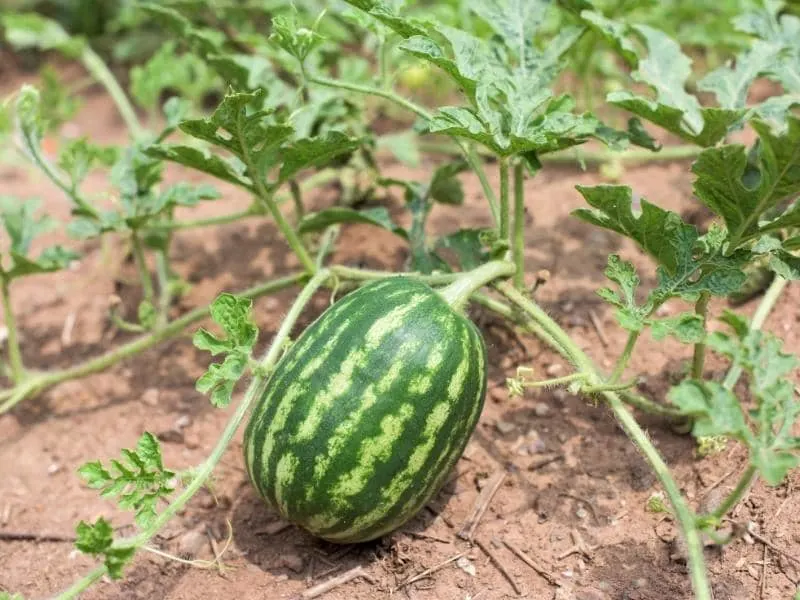You probably already know what watermelon can do for you. People love the taste of watermelon as it is highly healthy food. They can use watermelon to stay healthy and hydrated during the summer. But are deer eating watermelon?
Do deer eat watermelon from your garden? Here’s what you need to know.
Do deer eat watermelon?
If a bunch of hungry deer discover watermelon, they will consume it. Deer are frequently observed eating watermelon in the wild. Watermelon is a relatively low-calorie and low-fat food that can satisfy the hunger of herbivorous deer. Although it is unclear how much deer consume.
Table of Contents

But even with a large “crop” of watermelon, it is unlikely that bones would be discovered. Depending on your plans, it’s not worth the extra effort to grow them for just one person.
Watermelon:
Watermelon is not a food that deer are naturally attracted to. In fact, they may be turned off by it. A deer may eat watermelon if forced to do so, but this is not the standard way to consume food.
An alternative is that they are typically drawn to items such as acorns and nuts, which contain significant amounts of energy and nutrients.
Watermelon plants and vines:
Deer are known to consume watermelon plants and vines. They may nibble on the lower leaves of a watermelon plant, but this is not the usual way they consume their food.
It is critical to keep an eye on your plants because deer are cunning creatures who will often eat things that are not visible to the human eye.
Watermelon rinds:
Watermelon rinds are a favorite snack for deer. Deer may consume the rinds in order to satisfy their hunger, as they can provide them with essential nutrients. It is preferable to properly dispose of the rinds, either by composting them or throwing them away.
In the watermelon, they savor the succulent flesh on the inside of the fruit.
Watermelon seeds:
It is not uncommon for deer to avoid eating the seeds of watermelon. The seeds contain high levels of sugar and other nutrients that are not usually required by deer, making them an excellent energy source.
It is unlikely that they will consume them unless they are starving and have no other option.
Is watermelon deer resistant?
Generally, watermelon is not deer resistant. Despite the possibility of a deer being resistant to watermelon, this is not the typical way they consume their food. The items that they are most attracted to are high in energy and nutrients, such as acorns and nuts.
Growing watermelon for yourself requires you to keep a close eye on your plants and recognize any deer signs approaching your crop.
If they eat any of your plants, there is no need to be concerned; simply dispose of the offending materials responsibly to avoid further complications.
On the other hand, if you are attempting to discourage deer from eating your plants, it may be prudent to look for alternatives. For example, a high fence on a trellis can be an effective deterrent against intruders.
Motion-sensor lights that turn on at dusk and bright objects such as aluminum foil reflectors or shiny metal pots with holes punched through them are other things that deer are attracted to.
Do deer like to eat watermelon and watermelon rind?
Deer enjoy eating watermelon when it is ripe and fresh, which is when it is in season. The rind of the watermelon is what they usually eat, and they don’t care for the rind as much as they do the flesh of the fruits.
If you want to keep deer from eating your watermelon, you can use a tall fence or other deterrents to keep them away from your garden.
In addition, you must plant watermelons away from the vegetable patch. However, suppose you want to avoid dealing with deer finding your fruit trees and eating them.
It would be best to consider installing a high fence around your garden or planting some other plants that are easily distinguishable as being deer-free.
Is watermelon and watermelon rind good for deer?
Watermelon and watermelon rind are both beneficial to deer in the wild. The nutritional value of the fruits and the rinds are different, but they are both high in sugar content.
Watermelon is an excellent food source for deer because it contains a high amount of energy and nutrients like vitamin C.
Additionally, watermelon’s rind is high in zinc and Vitamin A, while the flesh is high in lycopene, beta carotene (antioxidants), folic acid, and protein, among other nutrients.
All of these nutrients are beneficial to deer health because hunters require them to aid in the development of their winter coats. On the other hand, the fruit is not suitable for consumption by deer.
It can wreak havoc on your garden, and you may discover that you will not resolve the problem no matter what you do.
How to keep deer from eating watermelons?
If you want to keep deer from preying on your watermelon, you can take a few precautions. For example, you can use a tall fence or another type of deterrent to keep people away. Here are some suggestions to help you keep deer away from your watermelons.
Install a deer fence:
Firstly, if you don’t have a fence, install one. Deer will not cross a sturdy wall to get to your watermelons. Plant vines or ground covers around the base of the plants.
These will act as a deer barrier, and they are also attractive to the deer so that they will not want to eat the fruit from your watermelon vines.

Create a watermelon sanctuary:
You can designate one garden as a “watermelon sanctuary” if you have more than one garden. Keeping deer from raiding your other gardens and searching for food will be easier with this method.
You can use scare devices such as motion-activated lights or loud noises to deter deer from approaching.
Keep the garden clean:
Watermelon vines will proliferate and produce fruit, so keep the garden clean to help deter deer from coming close to your watermelons. Hose down areas where the plants are regularly growing, and sweep up leaves and other debris around them once a week.
Clean out unwanted flowers or shrubs that encroach on your watermelon space, as this is also an attraction for deer.
Scare the deer away:
You can scare the deer away from your property by making loud noises or using bright lights. Please make sure that you do this when they are most active, in the late afternoon and early evening.
Burbling water fountains, fireworks, or a spotlight shined into a wild animal enclosure can all be used to attract their attention and make them afraid of approaching your fruit crop. Plant different vegetables that deer don’t eat near your watermelon patch.
Cabbage, kale, and beans are examples of vegetables that deer will not consume. Providing a different food source for the deer will hopefully discourage them from striking your watermelons altogether.
In areas where deer are prevalent, you should plant those vegetables that don’t attract deer.
It would be best to keep in mind that not all deterrence methods will be effective on all deer. In some cases, using deterrents such as fluorescent lights, electronic fence systems, or large metal objects such as sheds or cattle gates around their watermelon plants has proven effective.

What wild animals eat watermelon in the garden?
Animals consume watermelon in the garden, but they are not the primary perpetrators of this offense. Deer are the primary predators of watermelons, and if they can get their hands on some, they will devour them.
Aside from squirrels and birds, raccoons and opossums are among the animals that may prey on your watermelon.
Aside from that, some curious carnivorous pests will try to eat your watermelon crop if you have any. In some cases, the white mason bee catoblepas has been observed sucking the sap from a growing watermelon causing it to pass away due to a lack of nutrients.
This eventually causes tissue necrosis, which results in the fruit rotting away thoroughly after only 5–10 days.
Final Thoughts
Deer eat watermelon. Overall, it is essential to be aware of the various animals that may consume your watermelon in the garden and take the necessary precautions to prevent it. Use bubbling water fountains, fireworks, or lighting an enclosure with wild animals to keep deer away.
